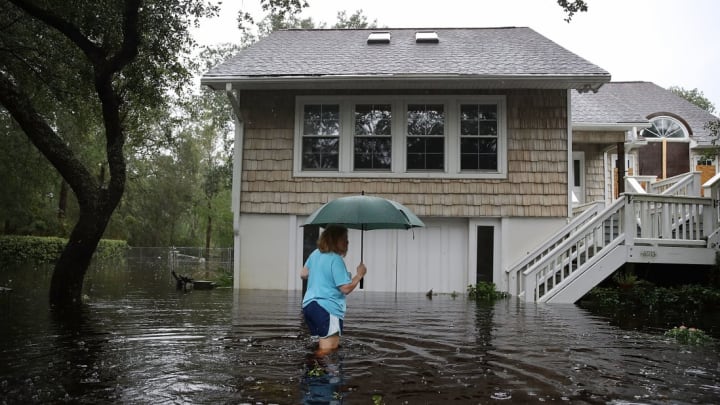Hurricane Florence pummeled the Carolinas over the weekend, flooding areas with more than 30 inches of rain and leaving at least 17 people dead. The storm has since weakened, but the long process of recovery is just beginning. Here are some ways you can help those affected by the disaster.
1. GIVE BLOOD.
In light of the storm, over 120 blood drives were canceled in seven states in the southern U.S. That means donated blood is now scarce at a time when the region needs it most. If you're able to donate and you live in an area that wasn't impacted by the hurricane, the American Red Cross asks that you find an upcoming drive near you and schedule an appointment.
2. GIVE TO NATIONAL CHARITIES.
It's always best to give monetary donations in place of sending food or supplies following a disaster, and there are several established organizations that will turn your cash into resources for survivors. The American Red Cross is one of the largest charities aiding in the recovery, and one of the easiest to support. You can donate online or text "RED CROSS" to 90999 to make a $10 donation. If you're more interested in helping with mid- to long-term rehabilitation efforts, consider giving to United Way or Habitat for Humanity. And no matter where you donate, run the organization through a site like Charity Navigator first to see where exactly your dollar is going.
3. GIVE TO LOCAL CHARITIES.
An even more direct way to help is to give to charities based in the affected areas. The Diaper Bank of North Carolina is distributing diapers, wipes, and feminine hygiene products to hurricane victims, and it's accepting both cash donations and supplies. Many food banks, including the Food Bank of Central and Eastern North Carolina, are also looking for cash contributions or non-perishable items. You can also find groups and individuals in need of help through GoFundMe. The crowdfunding site has a list of relevant campaigns here.
4. FOSTER OR ADOPT A PET.
It wasn't just people who were affected by Hurricane Florence. Pets were displaced as well, and many are still in need of safe homes. If you're in the position to, see if you can adopt or foster an animal from a shelter located in the recovery zone. And if you're not ready to be a pet parent, local shelters will gladly take your donations instead.
5. VOLUNTEER.
Do you live in or near the recovery area? There are plenty of organizations working there that would be grateful for your time. The Red Cross is looking for volunteers, as is National Voluntary Organizations Active in Disaster (NVOAD). You can also apply to help directly through the North Carolina governor's office.
